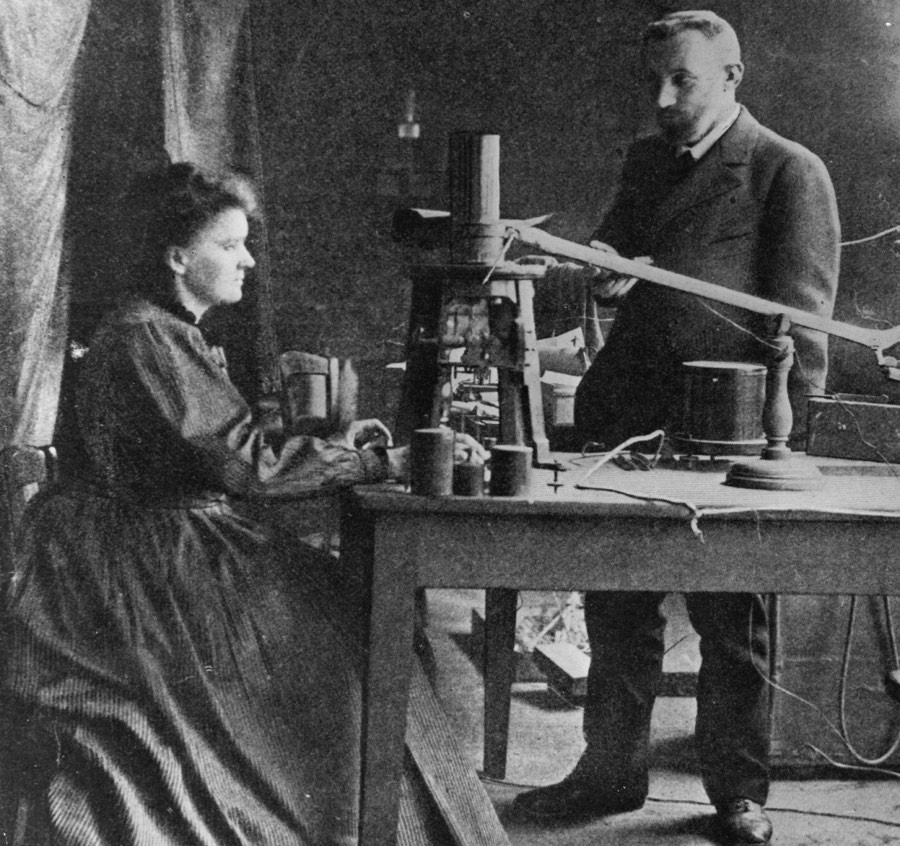Are the Nobel Prizes Missing Female Scientists?

Get the world’s most fascinating discoveries delivered straight to your inbox.
You are now subscribed
Your newsletter sign-up was successful
Want to add more newsletters?
Join the club
Get full access to premium articles, exclusive features and a growing list of member rewards.
The Nobel Prize has a woman problem.
A total of 203 people have won the Nobel Prize in physics, but only two were women (Marie Curie in 1903 and Maria Goeppert-Mayer in 1963). Many scientists say those numbers point to a fundamental problem with the prizes and how they are awarded.
Science writer and physicist Matthew Francis wrote on his blog, Galileo's Pendulum, that the prize favors men of European descent, and European and American researchers in general. That bias, he said, is part of a larger problem of excluding women and minorities for consideration.
"The difficulty may ultimately lie in the fact that it's nearly impossible to honor the science without tripping up on which scientists to assign that honor to," Francis wrote in an email to Live Science. [Nobel Prize 2016: Here Are the Winners (and What They Achieved)]
Women in science
"I do think that, increasingly, the Nobels have a public relations problem," said Chanda Prescod-Weinstein, a theoretical astrophysicist at the University of Washington in Seattle.
Prescod-Weinstein and many others noted on Twitter (with the hashtag #NobelforVeraRubin) the example of Vera Rubin. Rubin discovered the anomalies in the way galaxies rotate that provided evidence for the existence of dark matter, one of the universe's greatest scientific mysteries. This accomplishment was not awarded a Nobel Prize, although many scientists (and nonscientists) say it deserved the honor.
Searching #NobelforVeraRubin yields many people calling for Rubin to be recognized. Nobel prizes can't be awarded posthumously, and Rubin is 88 years old — so there's a sense of urgency. As science writer Rachel Feltman of The Washington Post tweeted, "Vera Rubin deserves a Nobel. She probably won't get one in time."
Get the world’s most fascinating discoveries delivered straight to your inbox.
Emily Levesque, an assistant professor of astronomy at the University of Washington, tweeted, "yet another year has now passed without the #NobelPrize recognizing the groundbreaking detection of dark matter by Vera Rubin..." and "Dark matter utterly revolutionized our concept of the universe; it's basically spawned entire subfields within physics at this point." [Female Firsts: 7 Women Who Broke Barriers in Science and Tech]
Physics isn't the only field with a dearth of female Nobel laureates. According to the Nobel Committee website, 171 people have won the Nobel Prize in chemistry, and only four have been women: Marie Curie (1911), her daughter Irène Joliot-Curie (1935), Dorothy Hodgkin (1964) and Ada Yonath (2009).
Women have fared a bit better in medicine and literature. Out of the 211 total recipients of the Nobel Prize in physiology or medicine, 12 have been women. And of the 112 total recipients of the Nobel Prize in literature, 15 have been women. Women have picked up 16 Nobel Peace Prizes of the 129 that have been awarded to either individuals or organizations. The Nobel Prize in economics, which has existed only since 1969, has honored only one woman of the 76 laureates.
It isn't as though women haven't been nominated, though the numbers are still small. Lise Meitner was nominated no less than 48 times by different people between 1937 and 1965 for prizes in physics and chemistry. (She died in 1968, having never been awarded a Nobel.) Astrophysicist Margaret Burbidge was nominated in 1964 for the Nobel in physics; that year the Nobel laureates in physics were Charles Hard Townes, Nicolay Gennadiyevich Basov and Aleksandr Mikhailovich Prokhorov for work in electronics that allowed for new kinds of transistors.
Award structure
The way Nobel Prizes are awarded could partly explain why women are underrepresented, some researchers say. First, it can take time to measure the impact of scientific work. Sometimes, the prize for a particular scientific accomplishment is not awarded until decades after the initial research is done, though that's not always the case. [What's Missing From the Nobel Prizes? Scientists Weigh In]
Another major problem, many scientists say, is that no more than three people can share a prize — but that doesn't reflect how science is actually done. Most research, especially in physics, involves many people — there can be up to hundreds of authors listed on a typical particle-physics paper, for example. (In fact, in physics, authors are often listed in alphabetical order for this very reason). A recent article in Science noted that if the physics Nobel had been awarded to the LIGO team, for the observation of gravitational waves, a contender might be Barry Barrish, who was instrumental in building the interferometer.
"I definitely think it should be possible to award the prize to teams," said Prescod-Weinstein. For example, in 2011, three men won the Noble Prize for the discovery that the universe's expansion is speeding up — an idea known as cosmic acceleration.
"The cosmic acceleration discovery was definitely a team effort, including making sure the data was correctly interpreted when they first started looking at it," Prescod-Weinstein said.
Maria von Konow, communications manager for Nobel Media, noted that Alfred Nobel's will and the Swedish Academy of Sciences set the criteria for nominations. The Nobel Peace Prize has been awarded to organizations, but the rules that were set up to award the physics prize were different. It's possible for the rules to change – the Nobel Foundation statutes have a procedure for doing so. But so far there's been no action on that front, at least not publicly.
Francis added that an entirely different award structure might be a good idea. "Ideally, there should be a range of prizes, whether called Nobels or not, to honor both discoverers and pioneers, but also to adequately honor collaborations (instead of just their leaders, who tend to be white guys because they get promotions denied to others) and recent work, rather than primarily decades-old research," he said in a an email to Livescience.
Righting past omissions would also help, Prescod-Weinstein said. For example, in 1974, the Nobel prize in physics was awarded to two recipients — Antony Hewish and Martin Ryle — for the 1967 discovery of pulsars, a type of star that pulses rapidly. Yet the actual discovery made by poring over the data from radio telescopes, was the work of Jocelyn Bell.
"Tthe prize should be able to retroactively correct errors, such as Jocelyn Bell not receiving the prize for her own discovery, with her advisor getting it instead," Prescod-Weinstein said.
Can the Nobels be fixed? Prescod-Weinstein said the committee could be more open to changes in how it awards the prizes.
"Eventually, it becomes hard to take the selections seriously, because we have no idea what factors are taken into consideration, except that somehow, it ends with only white and Asian men receiving the prize," Prescod-Weinstein said. (Sir William Arthur Lewis is the sole black Nobel laureate in the sciences [economics, 1979], and there are six science laureates who are Latino.)
The nominations for the prizes, and the deliberations that went into the awards, are kept secret for 50 years. So it's hard to know whether more women were nominated in the 1970s and 1980s, and we won't know for another decade. It's possible Rubin, for example, was nominated, and passed over.
Some, like Francis, say it might be time to retire the Nobels. "They're fundamentally about something that's not an adequate reflection of real science, and they reinforce the worst aspects of the culture of science," he said. "Maybe we should dump 'em and start over."
Original article on Live Science.

 Live Science Plus
Live Science Plus










